Related Research Articles
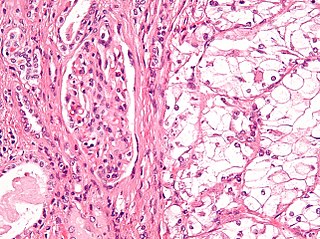
Kidney cancer, also known as renal cancer, is a group of cancers that starts in the kidney. Symptoms may include blood in the urine, a lump in the abdomen, or back pain. Fever, weight loss, and tiredness may also occur. Complications can include spread to the lungs or brain.

Wilms' tumor or Wilms tumor, also known as nephroblastoma, is a cancer of the kidneys that typically occurs in children, and occurs most commonly as a renal tumor in child patients. It is named after Max Wilms, the German surgeon (1867–1918) who first described it.
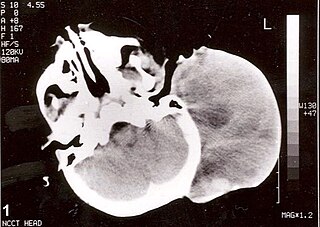
Rhabdomyosarcoma (RMS) is a highly aggressive form of cancer that develops from mesenchymal cells that have failed to fully differentiate into myocytes of skeletal muscle. Cells of the tumor are identified as rhabdomyoblasts.

Beckwith–Wiedemann syndrome is an overgrowth disorder usually present at birth, characterized by an increased risk of childhood cancer and certain congenital features. A minority (<15%) of cases of BWS are familial, meaning that a close relative may also have BWS, and parents of an affected child may be at increased risk of having other children with BWS. While children with BWS are at increased risk of childhood cancer, most children with BWS do not develop cancer and the vast majority of children who do develop cancer can be treated successfully.
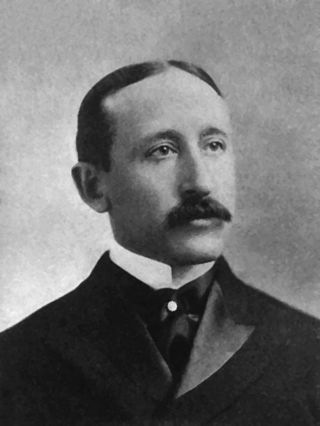
James Stephen Ewing was an American pathologist. He was the first professor of pathology at Cornell University and discovered a form of bone cancer that was later named after him, Ewing sarcoma.
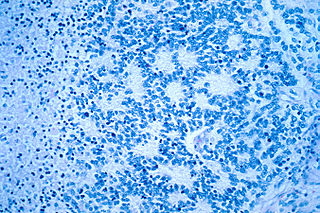
Neuroblastoma (NB) is a type of cancer that forms in certain types of nerve tissue. It most frequently starts from one of the adrenal glands but can also develop in the head, neck, chest, abdomen, or spine. Symptoms may include bone pain, a lump in the abdomen, neck, or chest, or a painless bluish lump under the skin.

Sidney Farber was an American pediatric pathologist. He is regarded as the father of modern chemotherapy for his work using folic acid antagonists to combat leukemia, which led to the development of other chemotherapeutic agents against other malignancies. Farber was also active in cancer research advocacy and fundraising, most notably through his establishment of the Jimmy Fund, a foundation dedicated to pediatric research in childhood cancers. The Dana–Farber Cancer Institute is named after him.

Alfred George Knudson, Jr. was an American physician and geneticist specializing in cancer genetics. Among his many contributions to the field was the formulation of the Knudson hypothesis in 1971, which explains the effects of mutation on carcinogenesis.

Hepatoblastoma is a malignant liver cancer occurring in infants and children and composed of tissue resembling fetal liver cells, mature liver cells, or bile duct cells. They usually present with an abdominal mass. The disease is most commonly diagnosed during a child's first three years of life. Alpha-fetoprotein (AFP) levels are commonly elevated, but when AFP is not elevated at diagnosis the prognosis is poor.

A blastoma is a type of cancer, more common in children, that is caused by malignancies in precursor cells, often called blasts. Examples are nephroblastoma, medulloblastoma, and retinoblastoma. The suffix -blastoma is used to imply a tumor of primitive, incompletely differentiated cells, e.g., chondroblastoma is composed of cells resembling the precursor of chondrocytes.
Malignant rhabdoid tumour (MRT) is a very aggressive form of tumour originally described as a variant of Wilms' tumour, which is primarily a kidney tumour that occurs mainly in children.
Clear cell sarcoma of the kidney (CCSK) is an extremely rare type of kidney cancer comprising 3% of all pediatric renal tumours. Clear cell sarcoma of the kidney can spread from the kidney to other organs, most commonly the bone, but also including the lungs, brain, and soft tissues of the body.

Congenital mesoblastic nephroma, while rare, is the most common kidney neoplasm diagnosed in the first three months of life and accounts for 3-5% of all childhood renal neoplasms. It is generally non-aggressive and amenable to surgical removal, though there is a subtype that is more aggressive and tends to spread to other organs. Congenital mesoblastic nephroma was first named as such in 1967 but was recognized decades before this as fetal renal hamartoma or leiomyomatous renal hamartoma. It is embryologically derived from the metanephrogenic blastema, the same tissue that gives rise to nephroblastomatosis and Wilms tumor.

Oncology is a branch of medicine that deals with the study, treatment, diagnosis, and prevention of cancer. A medical professional who practices oncology is an oncologist. The name's etymological origin is the Greek word ὄγκος (ónkos), meaning "tumor", "volume" or "mass". Oncology is concerned with:
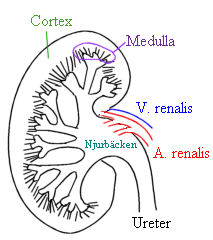
Renal medullary carcinoma is a rare type of cancer that affects the kidney. It tends to be aggressive, difficult to treat, and is often metastatic at the time of diagnosis. Most individuals with this type of cancer have sickle cell trait or rarely sickle cell disease, suggesting that the sickle cell trait may be a risk factor for this type of cancer.

Juan Rosai was an Italian-born American physician who contributed to clinical research and education in the specialty of surgical pathology. He was the principal author and editor of a major textbook in that field, and he characterized novel medical conditions such as Rosai-Dorfman disease and the desmoplastic small round cell tumor. Rosai is also well-known because of his role as teacher, mentor and consultant to many American and international surgical pathologists.

Endodermal sinus tumor (EST) is a member of the germ cell tumor group of cancers. It is the most common testicular tumor in children under three, and is also known as infantile embryonal carcinoma. This age group has a very good prognosis. In contrast to the pure form typical of infants, adult endodermal sinus tumors are often found in combination with other kinds of germ cell tumor, particularly teratoma and embryonal carcinoma. While pure teratoma is usually benign, endodermal sinus tumor is malignant.
Alan D. D'Andrea is an American cancer researcher and the Fuller American Cancer Society Professor of Radiation Oncology at Harvard Medical School. D'Andrea's research at the Dana Farber Cancer Institute focuses on chromosome instability and cancer susceptibility. He is currently the director of the Center for DNA Damage and Repair and the director of the Susan F. Smith Center for Women's Cancer.
Lotte Strauss was a German-American pathologist.
References
- 1 2 "John Bruce Beckwith". Whonamedit?. Retrieved 2018-08-24.
- 1 2 D'Angio, Giulio J.; Evans, Audrey E.; Knudson, Alfred; Meadows, Anna T. (2005). "The American Society of Pediatric Hematology/Oncology distinguished career award goes to J. Bruce Beckwith, MD". Pediatric Blood & Cancer. 44 (6): i–ii. doi: 10.1002/pbc.20405 . ISSN 1545-5009. PMID 15795885. S2CID 71894373.
- ↑ "J. Bruce Beckwith, MD". National Wilms Tumor Study Group. Retrieved 2018-08-24.
- 1 2 3 "Studying a Miracle". The Whitman College Magazine Online: Alumni. December 2000. Archived from the original on 2019-04-24. Retrieved 2018-08-24.
- ↑ Mills, Steve (1997-05-20). "6 Infants' Deaths Still Puzzling To Experts". Chicago Tribune. Retrieved 2018-08-24.
- ↑ Beckwith, J. Bruce (March 1995). "J. Bruce Beckwith, M.D., recipient of the 1994 Fred W. Stewart Award". The American Journal of Surgical Pathology. 19 (3): 368. doi:10.1097/00000478-199503000-00016. ISSN 0147-5185. PMID 7872436.
- ↑ "Astute Clinician Lectures". NIH Clinical Center. Archived from the original on 2017-05-13. Retrieved 2018-08-24.